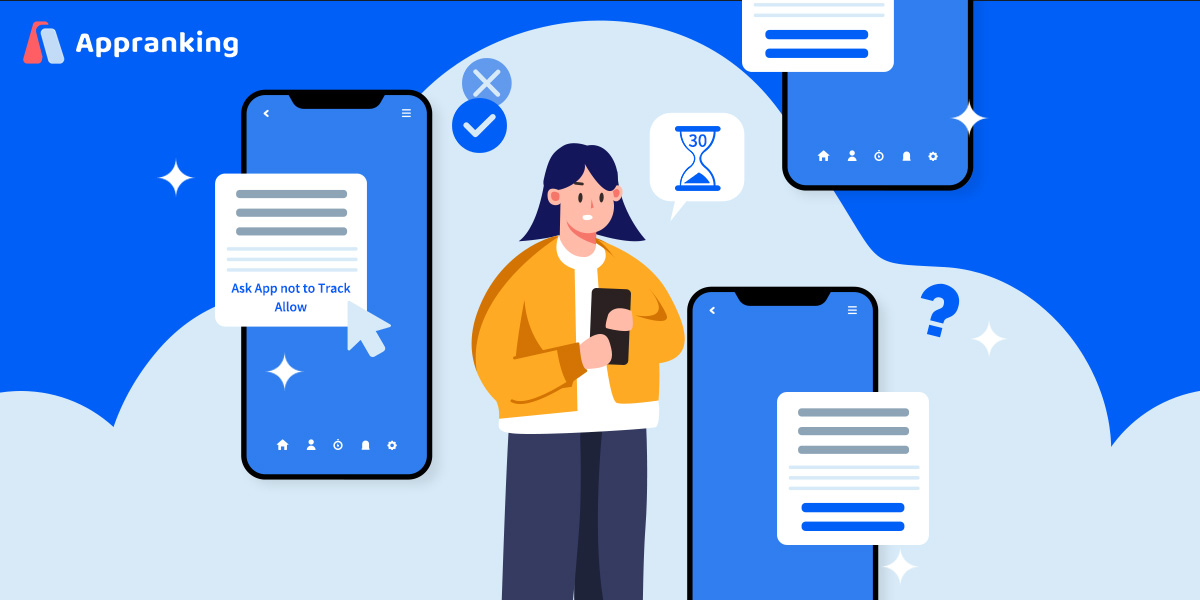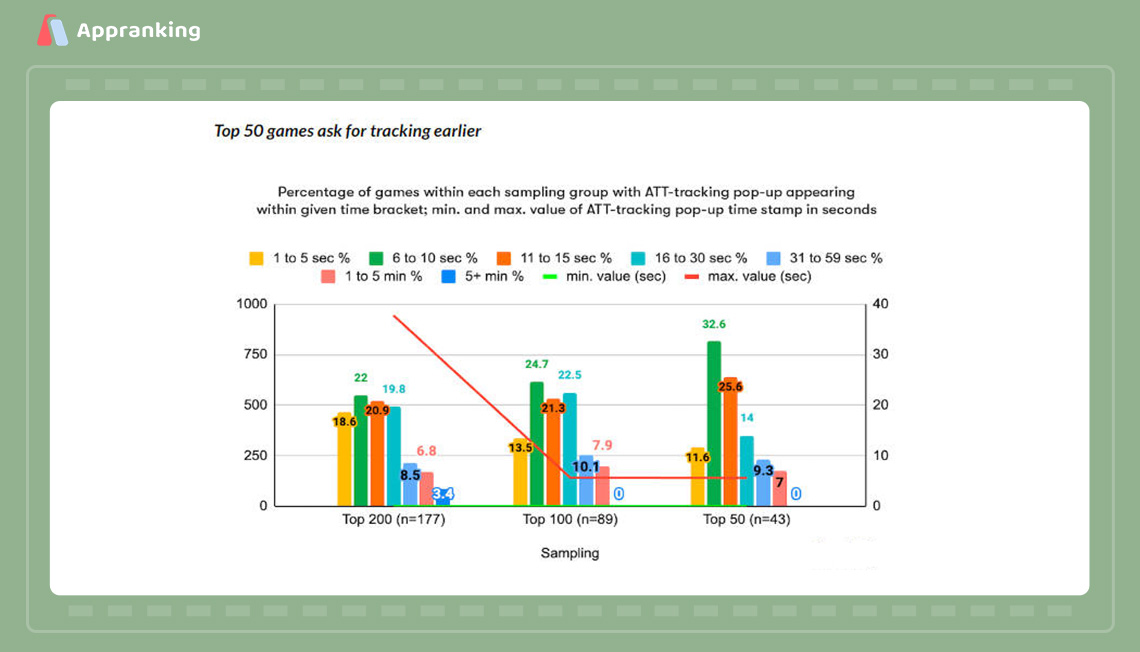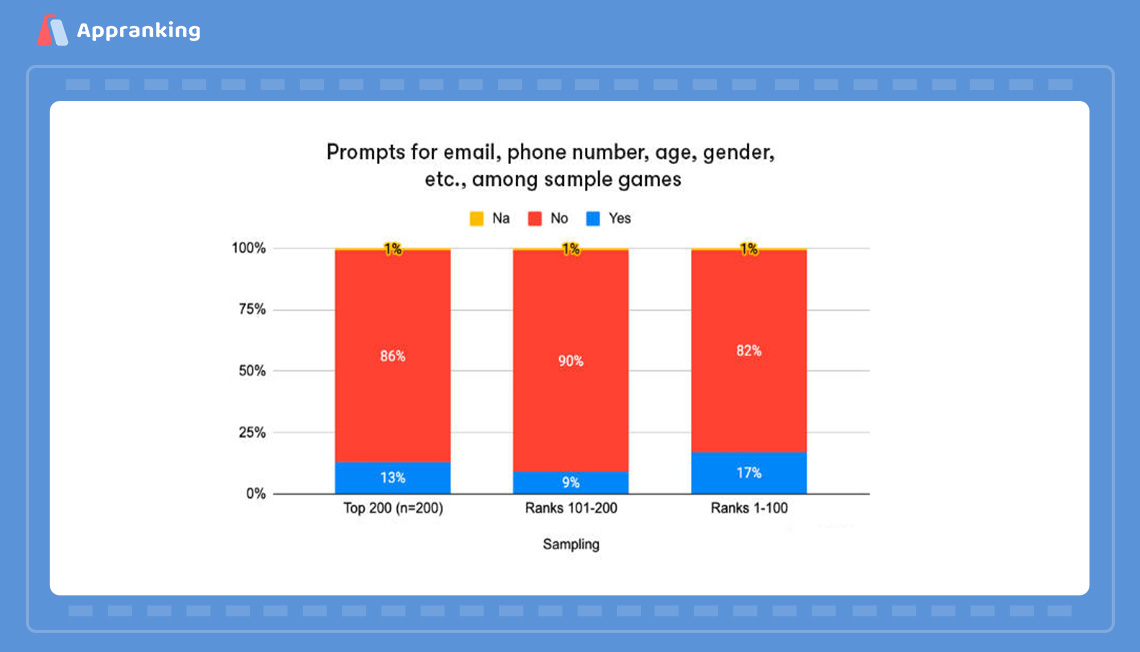
In April 2021, Apple introduced the App Tracking Transparency (ATT) policy, which required companies to obtain user permission before tracking their data for advertising purposes. This policy update had significant consequences for mobile marketers and advertisers, who faced challenges in accessing the data necessary for effective user acquisition. According to reports, companies like Snap, Facebook, Twitter, and YouTube collectively experienced losses of nearly $10 billion as a result of the implementation of ATT.
Timing of In-App Pop-up Notifications for ATT Permission: Adherence and Variations
To comply with the ATT policy, companies typically utilize in-app pop-up notifications that give users the option to allow or deny tracking on a per-app/game basis. However, there are no specific guidelines regarding when or where these pop-up notifications should appear within the app.
An analysis of the ATT tracking pop-up data from the top-grossing US games revealed interesting patterns. The majority of sampled games (88%) implemented ATT pop-ups within a 25-minute timeframe, demonstrating widespread adherence to Apple's privacy policy guidelines. However, 11% of the games did not feature any pop-ups within the same time frame, possibly due to the pop-up appearing much later in the game or the developers choosing not to seek access to the identifier.
Furthermore, 81% of the 177 games with ATT pop-ups displayed them within the initial 30 seconds of gameplay. The specific timing of the pop-ups varied, ranging from 1 second to 15 minutes after launching the application. This indicts that some games opt to establish trust with users during their gameplay session before requesting permission to track their data.
Notably, established mobile games that were download darlings, with fewer new titles entering the market, tended to display the pop-up within the first 30 seconds, with 84% of the games exhibiting this behavior. Among the top 50 games, 58% displayed the pop-up between 6 and 15 seconds, indicating a potential "golden window" for ATT pop-up timing.

Additional Prompts for User Information: Usage and Revenue Correlation
The analysis also revealed that a small percentage of the sampled games (13%) included supplementary prompts requesting additional user information such as email addresses, phone numbers, age, gender, and other personal data. The presence of these additional prompts varied based on the games' rankings in the top-grossing chart. Among the games within the top-grossing 100 chart, 17% included such prompts, whereas only 9% of the games ranked between 101 and 200 featured them. Games generating higher revenue are approximately 89% more likely to request additional user information compared to games ranking between 101 and 200.

Benefits and Explanations Offered by Developers in the ATT Window
When prompted with the ATT window, developers provided various reasons to their users. These aimed to justify the need for permission and offer incentives for allowing data tracking.
Some of the functional benefits included saving game progress, optimizing content, creating a better gaming experience, playing across multiple devices, and enabling third-party logins. In the social aspect, they highlighted the ability to connect with friends, find more players, and share in-game achievements on social networks. Ads-related reasons mentioned personalized ads, seeing ads in other apps, and tracking ad preferences. Developers also flirted with additional value propositions such as offers, discounts, keeping the game free, customized content, and free rewards from video ads.
Negative framing was used to create a fear of missing out, emphasizing that disabling third-party logins would make them non-functional and that not allowing tracking would result in non-personalized ads.
Furthermore, developers sometimes offered only partial information, mentioning one purpose of IDFA usage, such as knowing how users found out about the game or connecting with their account to prevent access loss. It's important to note that users can change their minds at any point in the future, indicating the flexibility of their consent.
We Appranking, a smart app promotion platform, are now inviting some valuable developers and app promoters to try our features FOR FREE.
With our website, you can get the latest market news and quickly understand your competitor's strategy, market data, etc. to IMPROVE YOUR APP'S RANKING within the app stores.
Click here to try all our features for free and save up to $399!
Unlock the world of app promotion and join our vibrant community. 🎊App Developing & Marketing (Android & iOS) - Linkedin Group
You'll gain access to the latest tech updates, a wealth of marketing insights, and an unexpected bonus! Join now and be part of the conversation.
Empower your team with our App Marketing Intelligence
Free forever. Cancel anytime.


